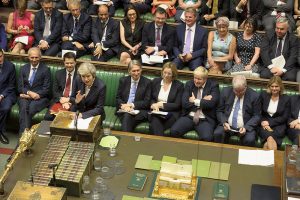
The British government’s claim that no deal with the EU would be better than a bad deal is “unsubstantiated” because of a lack of proper analysis, a UK parliamentary committee has warned.
The House of Commons Brexit committee, in a report published on Tuesday (4 April), urged prime minister Theresa May to work out how much a no deal scenario would cost.
The committee also said it was important to avoid reaching a situation where no deal is concluded.
“The Government has talked about walking away from a bad deal, but has not yet explained what terms would be demonstrably worse for the UK than ‘no deal’,” the Brexit committee said.
“The Government should therefore conduct a thorough assessment of the economic, legal and other implications of leaving the EU at the end of the Article 50 period with ‘no deal’ in place,” it added, asking that the results of the assessment to be published.
“Without an economic assessment of ‘no deal’ having been done and without evidence that steps are being taken to mitigate what would be the damaging effect of such an outcome, the Government’s assertion that ‘no deal is better than a bad deal’, is unsubstantiated,” the committee’s report claims.
Too gloomy
However, MPs were split along party lines on backing the assessment, with pro-Leave MPs saying that the report was biased and “too gloomy”.
In the end, the report was backed by 11 MPs to 6.
Last month, Brexit minister David Davis admitted in front of the committee that there had been no economic assessment of a “no deal” scenario since last June’s referendum.
“I cannot quantify that in detail yet. I may well do in about a years’ time,” he told MPs in March.
Failing to reach an agreement “is not as frightening as some people think, but it is not as simple as some people think”, Davis claimed.
Last year, the UK Treasury estimated that crashing out of the EU and trading with the bloc on World Trade Organisation (WTO) terms could cost the UK 7.5 percent in lost GDP growth by 2030.
The Brexit committee’s report warns that “falling back on WTO terms would mean not just a return to tariffs, but the reappearance of non-tariff barriers”.
More red tape
“That would mean more paperwork, border checks and bureaucratic requirements for British companies trading with the EU. For many businesses these can be far more costly than the actual tariff itself,” it adds.
MPs also warned that negotiating a good free trade agreement – one that covers financial services – with the EU was vital, as trade in services accounts for 42 percent of the UK’s exports to the EU.
“The Government will need to provide clarity on how it will address divergence in rules and standards, and resolve trade disputes, outside of the jurisdiction of the Court of Justice of the EU,” they said.
The MPs warned that it is not yet clear if negotiations can be wrapped up within 18 months, as was set out by EU chief negotiator Michel Barnier, and before the two-year period ends, which is inscribed in Article 50 of the Lisbon Treaty.
The report also urges the government to keep the UK’s migration policy flexible with the EU to “ensure that sectors currently reliant on EU workers do not face a sudden shortage of labour”.
In January Theresa May said that the UK would rather walk away without any agreement rather than submit to difficult terms if the other 27 member states try to play hard with London.
In her letter invoking the exit procedure from the EU last week, May called for an ambitious free trade agreement with the EU, whereas the bloc’s leaders have warned that those talks can only start on substance once the UK is out of the EU.
Source:euobserver
